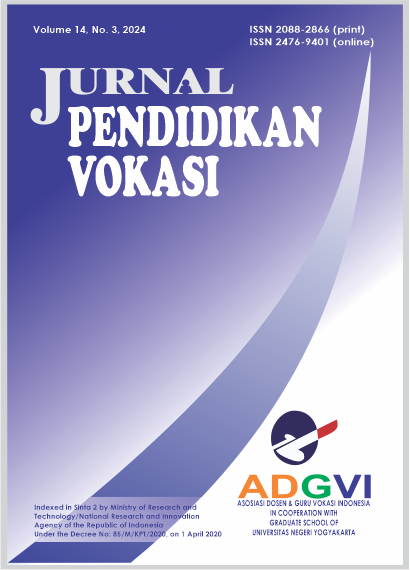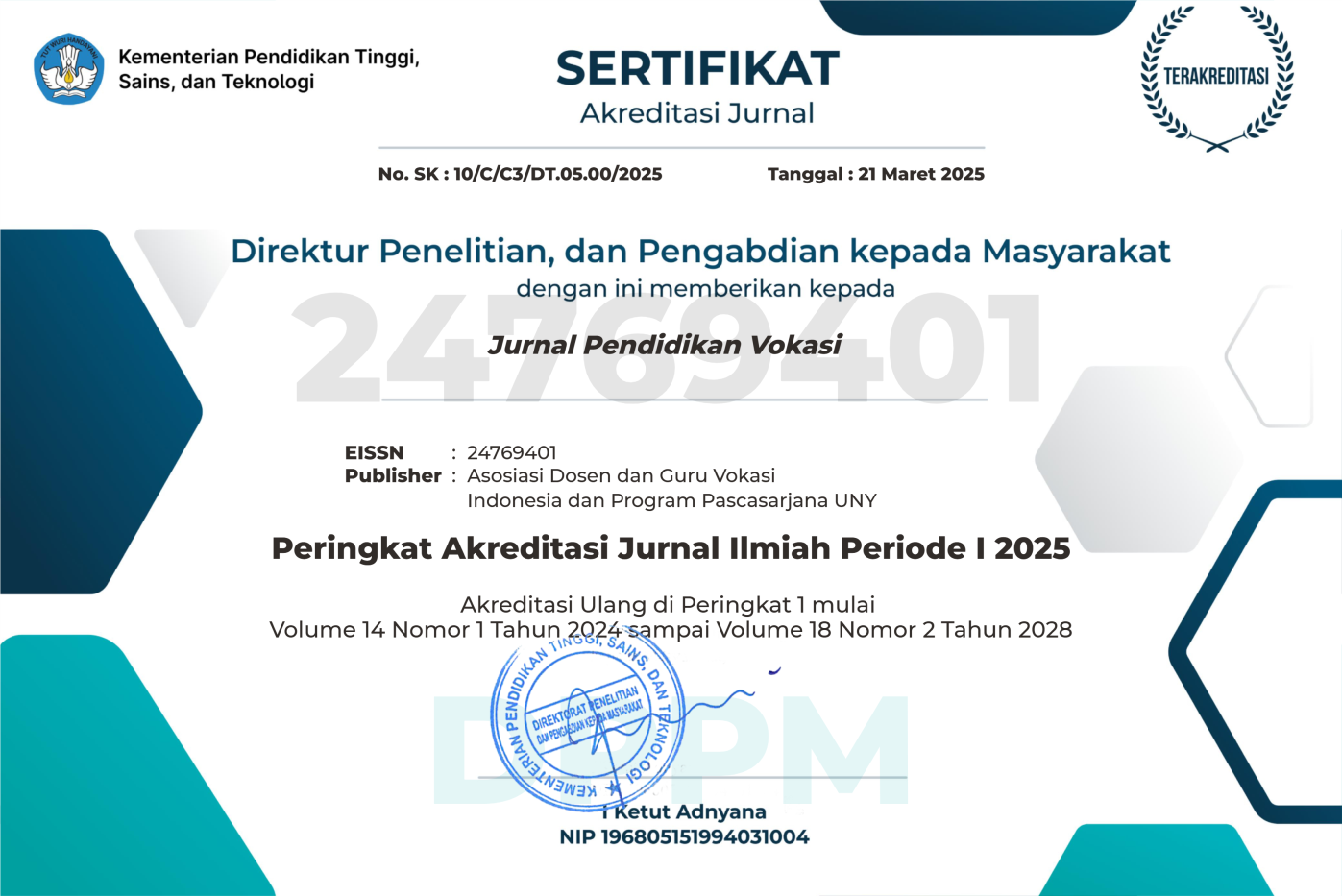Measuring prospective Korean technology teachers’ attitudes towards technology subjects in secondary schools
DOI:
https://doi.org/10.21831/jpv.v14i3.77865Keywords:
Attitude measurement, Instrument development, Prospective technology teachers, Secondary school education, Teacher training, Technology educationAbstract
This study aimed to develop and validate a measurement tool for assessing prospective technology teachers’ attitudes toward technology subjects in Korea and to examine differences across student groups. A major teacher education university in Korea was selected, and a survey was conducted among 80 undergraduate students from the first to fourth year who were preparing to become technology teachers. The instrument development process involved four stages: item generation, preliminary construction, validity testing, and reliability testing. Data were collected through postal and online questionnaires and analyzed using exploratory factor analysis and reliability tests. Attitudes toward technology subjects were defined as consistent psychological tendencies expressed in beliefs, affective feelings, and behavioral intentions. Results showed that the developed tool demonstrated strong validity and reliability, with three clear dimensions. Overall, students reported a relatively high attitude score (M = 4.15), with beliefs about technology education receiving the highest average score (M = 4.59). Significant differences were found based on gender, with female students showing stronger beliefs about technology subjects, and by grade level, where fourth-year students exhibited higher behavioral intentions compared to first-year students. These findings indicate that while prospective technology teachers in Korea hold strong beliefs and intentions toward technology subjects, their affective feelings remain less positive. This study contributes to vocational and teacher education research by providing a validated instrument for measuring technology education attitudes and by offering insights for curriculum design that fosters positive attitudes in future technology educators.
References
Asma, L., Molen, J. W. van der, & Aalderen-Smeets, S. van. (2011). Primary teachers’ attitudes towards science and technology. In Professional Development for Primary Teachers in Science and Technology (pp. 89–105). SensePublishers. https://doi.org/10.1007/978-94-6091-713-4_8
Bartleett, M. S. (1950). Tests of significance in factor analysis. British Journal of Statistical Psychology, 3(2), 77–85. https://doi.org/10.1111/j.2044-8317.1950.tb00285.x
Fishbein, M., & Ajzen, I. (2011). Predicting and changing behavior. Psychology Press. https://doi.org/10.4324/9780203838020
Hinkin, T. R. (1998). A Brief tutorial on the development of measures for use in survey questionnaires. Organizational Research Methods, 1(1), 104–121. https://doi.org/10.1177/109442819800100106
Kaiser, H. F. (1974). An index of factorial simplicity. Psychometrika, 39(1), 31–36. https://doi.org/10.1007/BF02291575
van Aalderen-Smeets, S. I., & Walma van der Molen, J. H. (2015). Improving primary teachers’ attitudes toward science by attitude-focused professional development. Journal of Research in Science Teaching, 52(5), 710–734. https://doi.org/10.1002/tea.21218
Xu, M., Williams, J. P., & Gu, J. (2020). An initial development and validation of a Chinese Technology Teachers’ Attitudes Towards Technology (TTATT) scale. International Journal of Technology and Design Education, 30(5), 937–950. https://doi.org/10.1007/s10798-019-09551-3
Published
How to Cite
Issue
Section
Citation Check
License
Copyright (c) 2025 Jurnal Pendidikan Vokasi

This work is licensed under a Creative Commons Attribution-ShareAlike 4.0 International License.
The authors submitting a manuscript to this journal agree that, if accepted for publication, copyright publishing of the submission shall be assigned to Jurnal Pendidikan Vokasi. However, even though the journal asks for a copyright transfer, the authors retain (or are granted back) significant scholarly rights.
The copyright transfer agreement form can be downloaded here: [JPV Copyright Transfer Agreement Form]
The copyright form should be signed originally and sent to the Editorial Office through email to jpvokasi@uny.ac.id
Jurnal Pendidikan Vokasi by http://journal.uny.ac.id/index.php/jpv is licensed under a Creative Commons Attribution-ShareAlike 4.0 International License.













